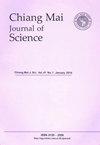Drying Characteristics and Mitragynine Content of Kratom Leaves
IF 0.8
4区 综合性期刊
Q3 MULTIDISCIPLINARY SCIENCES
引用次数: 0
Abstract
Dr ying is an essential process for preserving agricultural products. Most natural biological compounds are sensitive and easily degraded under drying conditions. This study investigated the effects of drying temperature (40, 50, 60, and 70°C), air velocity (0.05, 0.10, 0.15, and 0.20 m/s), and feed amount (0.60, 0.80, 1.00, and 1.30 kg/m2) on the moisture ratio, drying rate, mitragynine (MG) content, and specific energy consumption (SEC) of kratom leaves. The results showed that temperature, air velocity, and the quantity of kratom leaves significantly affected the drying process. The drying kinetics of kratom leaves were best explained by the Midilli-Kucuk model. The R2, reduced χ2, SSE, and RMSE values of the Midilli-Kucuk model under hot air drying varied from 0.9965 to 0.9993, 0.000075 to 0.000358, 0.001124 to 0.007869, and 0.007692 to 0.01740, respectively, for kratom leaves dried at 40, 50, 60, and 70°C. The MG content of dried kratom leaves at 40°C was the highest at 10.10 mg/g. The lowest SEC values, which corresponded to the highest amount of MG in the dried leaves, were achieved at a drying temperature of 40°C, an air velocity of 0.2 m/s, and a kratom leaves feed amount of 0.60 kg/m2.桔梗叶的干燥特性和米曲宁含量
干燥是保存农产品的重要过程。大多数天然生物化合物都很敏感,在干燥条件下很容易降解。本研究调查了烘干温度(40、50、60 和 70°C)、风速(0.05、0.10、0.15 和 0.20 米/秒)和进料量(0.60、0.80、1.00 和 1.30 千克/平方米)对桔梗叶的水分比、烘干率、丝氨酸(MG)含量和比能耗(SEC)的影响。结果表明,温度、风速和桔梗叶的数量对干燥过程有很大影响。Midilli-Kucuk 模型最能解释桔梗叶的干燥动力学。在 40、50、60 和 70°C 温度下干燥的桔梗叶,Midilli-Kucuk 模型的 R2、降低的 χ2、SSE 和 RMSE 值分别为 0.9965 至 0.9993、0.000075 至 0.000358、0.001124 至 0.007869 和 0.007692 至 0.01740。40°C 下干燥的桔梗叶中 MG 含量最高,为 10.10 mg/g。在烘干温度为 40°C、风速为 0.2 米/秒、桔梗叶进料量为 0.60 千克/平方米的条件下,SEC 值最低,与干叶中最高的 MG 含量相对应。
本文章由计算机程序翻译,如有差异,请以英文原文为准。
求助全文
约1分钟内获得全文
求助全文
来源期刊

Chiang Mai Journal of Science
MULTIDISCIPLINARY SCIENCES-
CiteScore
1.00
自引率
25.00%
发文量
103
审稿时长
3 months
期刊介绍:
The Chiang Mai Journal of Science is an international English language peer-reviewed journal which is published in open access electronic format 6 times a year in January, March, May, July, September and November by the Faculty of Science, Chiang Mai University. Manuscripts in most areas of science are welcomed except in areas such as agriculture, engineering and medical science which are outside the scope of the Journal. Currently, we focus on manuscripts in biology, chemistry, physics, materials science and environmental science. Papers in mathematics statistics and computer science are also included but should be of an applied nature rather than purely theoretical. Manuscripts describing experiments on humans or animals are required to provide proof that all experiments have been carried out according to the ethical regulations of the respective institutional and/or governmental authorities and this should be clearly stated in the manuscript itself. The Editor reserves the right to reject manuscripts that fail to do so.
 求助内容:
求助内容: 应助结果提醒方式:
应助结果提醒方式:


